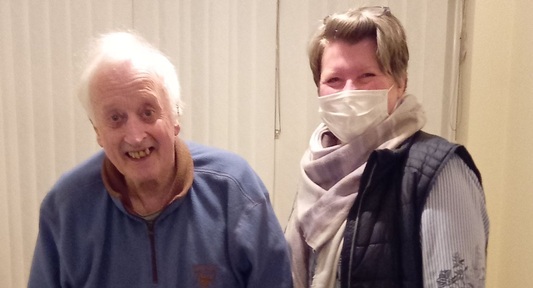Woman who took on care job after losing mum to cancer says 'small everyday moments can mean the world'
A woman who cared for her mum, who had terminal lung cancer, was inspired to become a home care worker after finding caring came “naturally” to her.

Emma Gorton, aged 42, took a break from her job as an office manager, to care for her mum until she passed away.
After her mum died, Ms Gorton was unsure what to do in terms of her working life. She said: “It was a difficult time and I was at one of life’s crossroads: I knew I didn’t want to go back to the office and I’d really enjoyed being there for mum; the district nurses said I’d done a great job and caring just came naturally to me.
"I was talking with a friend about my experience and she said Belong at Home had vacancies. With my background and no care qualifications, I didn’t think I’d be in with a shout but she advised that professional experience isn’t necessary and that they train colleagues who share their values."
So Ms Gorton took a new direction and became a Belong at Home community support worker in Didsbury, Altrincham and Warrington.
“I thought, ‘If I can look after people like my mum, then I’m on to a winner’ and so I decided to go for it.”
Joining the Belong at Home team as a community support worker, she now spends around 20 hours each week visiting older people in their homes in and around Warrington and south Manchester.
She initially trained on-the-job for The Care Certificate, designed for those who are new to care, as part of a comprehensive induction programme. Since then, she has gone on to achieve levels 2 and 3 NVQ in Health and Social Care, allowing her to progress to a senior position.
She said: “It didn’t take me long to realise I’d made the right decision. Belong at Home really cares about its team – they’re flexible with my childcare, the training is exceptional and they even pay for your time when travelling between customers, not just the time you spend caring for them and not all domiciliary care employers offer this.
“People often call us ‘carers’, but I prefer ‘support worker’ as you’re supporting adults, sometimes at the start of their dementia journey, to live and enjoy their lives as independently as possible. It might be accompanying them to the shops or having a chat over tea and biscuits, these small everyday moments mean the world to them, which makes my job very rewarding.”
Latest News
 29-Jul-24
Dementia Bus gives carehome.co.uk staff insight into life with dementia
29-Jul-24
Dementia Bus gives carehome.co.uk staff insight into life with dementia
 27-Jul-23
UK's top home care agencies in 2023 revealed
27-Jul-23
UK's top home care agencies in 2023 revealed
 30-Nov-22
A quarter of older people keep their falls secret from family
30-Nov-22
A quarter of older people keep their falls secret from family
 29-Nov-22
'Covid-19 has not gone away' say terminally ill
29-Nov-22
'Covid-19 has not gone away' say terminally ill
 28-Nov-22
IT consultant who received poor care opens 'compassionate' home care business
28-Nov-22
IT consultant who received poor care opens 'compassionate' home care business